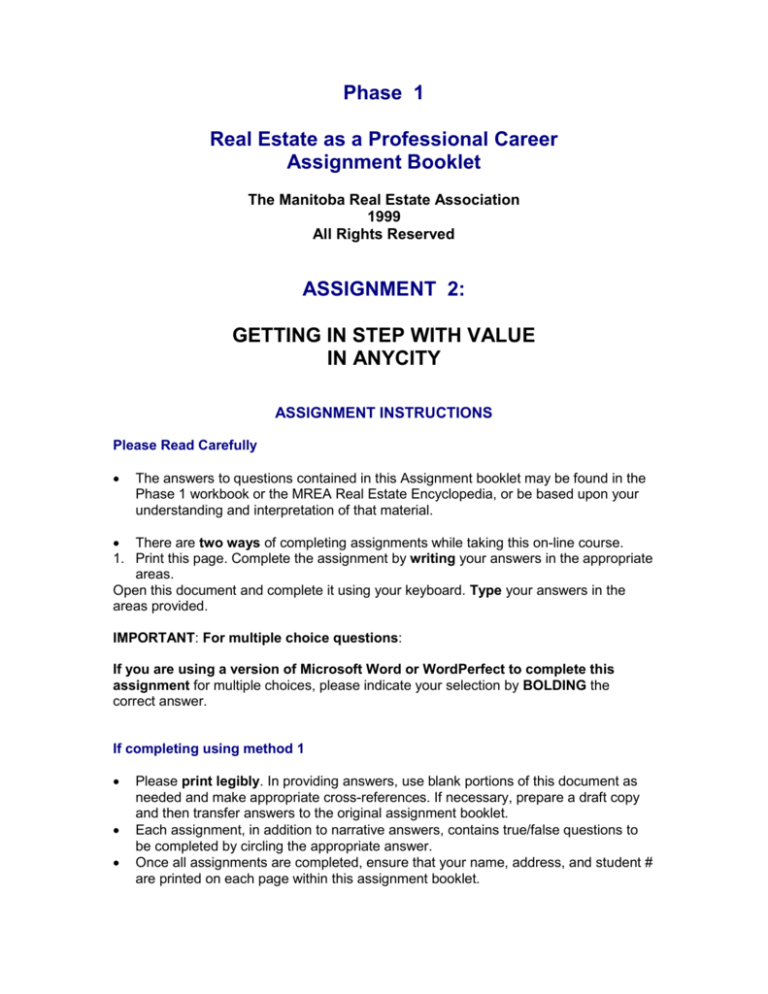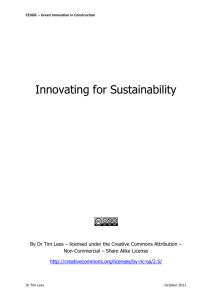
Phase 1
Real Estate as a Professional Career
Assignment Booklet
The Manitoba Real Estate Association
1999
All Rights Reserved
ASSIGNMENT 2:
GETTING IN STEP WITH VALUE
IN ANYCITY
ASSIGNMENT INSTRUCTIONS
Please Read Carefully
The answers to questions contained in this Assignment booklet may be found in the
Phase 1 workbook or the MREA Real Estate Encyclopedia, or be based upon your
understanding and interpretation of that material.
There are two ways of completing assignments while taking this on-line course.
1. Print this page. Complete the assignment by writing your answers in the appropriate
areas.
Open this document and complete it using your keyboard. Type your answers in the
areas provided.
IMPORTANT: For multiple choice questions:
If you are using a version of Microsoft Word or WordPerfect to complete this
assignment for multiple choices, please indicate your selection by BOLDING the
correct answer.
If completing using method 1
Please print legibly. In providing answers, use blank portions of this document as
needed and make appropriate cross-references. If necessary, prepare a draft copy
and then transfer answers to the original assignment booklet.
Each assignment, in addition to narrative answers, contains true/false questions to
be completed by circling the appropriate answer.
Once all assignments are completed, ensure that your name, address, and student #
are printed on each page within this assignment booklet.
After you have completed all tasks in all three assignments, forward the assignment
booklet to The Manitoba Real Estate Association, Education Department, 1873 Inkster
Blvd, Winnipeg MB R2R 2A6 for marking. Ensure that your name and student number
are on the booklet.
Please type in the following information:
Your Name:
Address:
Student Number:
Assignment 2: Getting In Step With Value In Anycity - Contents
Task 1 – The Listing Appointment
Task 2 – When is the Time Right
Task 3 – Fill-in-the Blanks
Task 4 – Review Questions
Task 1: The Listing Appointment
Mr. and Mrs. Dietrich have asked you, as a representative of ABC Realty Inc., to
discuss the listing of their property. The Dietrich home is an older, 1400 square
foot frame bungalow with a double garage on a large, treed, 100 feet x 150 feet
ravine lot in Orchard Lagoon. The sellers have lived in the home for over 40
years and raised a family, but are now contemplating a condominium for their
retirement years. A great deal has happened in Orchard Lagoon since their
arrival. Once a quiet neighbourhood consisting of less than ten homes scattered
along a township road near the river, Orchard Lagoon now boasts some of
Anycity's largest residences.
Vacant lots have been selling in the $80,000 to $120,000 range and a
ravine lot will command even more in today's market. Demand is strong and
supply is limited, as practically all prime vacant sites have been sold. With the
exception of one builder who has constructed new homes on three sites, serious
buyers must turn to existing housing with plans to demolish or substantially
renovate older residences. The builder has priced his homes in the $390,000 to
$425,000 range. The Dietrich home, in other neighbourhoods of comparable
homes, would probably be valued in the range of $165,000 to $175,000 range.
However, this situation is unique.
In your own words, discuss the principles of value that come into play when
attempting to establish market value for this property.
(Please provide answer on the following page.)
Type or Print your answer here:
Task 2: When is the Time Right?
Mr. and Mrs. Dietrich are concerned about timing regarding the sale of their
home and the demand for their particular property. As with many couples facing
retirement, capital resources are an integral part of that strategy. This home in
Orchard Lagoon represents their single, largest "nest egg" beyond the security of
their regular pension income.
Based on the graphs below, combined with your knowledge of unique
factors and forces that affect the real estate market, outline in point form the
major trends and factors that Mr. and Mrs. Dietrich must assess in deciding when
to offer their property for sale.
Answer:
Type or Print your answer here:
Task 3: Fill-in-the-Blanks
Builder Anderson owns the three new homes in Orchard Park that remain unsold.
His pricing strategy is based on the actual cost of construction plus site costs. In
appraisal terms, this is referred to as ___________________ value. When he
began construction, many buyers were considering new homes, but at point of
completion, the market seems to have vanished, as most prospects elected to
acquire older properties and demolish or renovate. The "few buyers/available
houses" scenario will have a direct impact on value and illustrates the principle of
_____________________.
In actual fact, Anderson's cost (including interest on borrowed funds) is
between $460,000 and $480,000 per home and expenses are rising while they
sit vacant. He is contemplating adding additional features with the knowledge
that he will be spending dollars that won't increase the value of the home or his
return, or lowering the listing price to "break-even", because in his words,
"Buyers these days just won't pay for extras. A triple garage can run $40,000, but
only seems to enhance value by $25,000 to $30,000". Anderson's problem
reflects the following principal of value: _____________
___________________.
As an added consideration, Anderson has heard rumours that not one but
two developers are contemplating new, comparable homes at the east side of
Orchard Park on the last undeveloped, wooded parcels of land. If these projects
proceed, the availability of alternatives in the local market will result in buyers
making decisions based on the principle of _____________________ and that
will affect market _________ in the area.
Task 4: Review Questions
1. Briefly describe the four factors that affect real estate demand. Briefly
describe the three factors that affect real estate supply.
Type or Print your answer here:
2. Real Estate Markets Really are Unique! What is meant by this statement and
how is the real estate market unique from other consumer markets?
Type or Print your answer here:
3. Explain the difference between market price and market value.
Type or Print your answer here:
4. What are the five rules of value?
Type or Print your answer here:
5. What are the four factors of production?
Type or Print your answer here:
6. A real estate market can be a buyer's market, a seller's market, or a balanced
market. What are the characteristics of each of these types of markets?
Type or Print your answer here:
7. True/False Questions
Circle or Highlight your answer for each of the following questions.
1. Smith feels that his home is worth between $270,000 and $290,000. Smith is
actually analysing the value of his home based on objective value.
a. True
b. False
2. Anticipated profit is one of four factors that affects demand when analysing
supply and demand forces in the marketplace.
a. True
b. False
3. The impact of the dilapidated bungalow on the value of Smith’s property is
explained by the principle of progression.
a. True
b. False
4. The actual cost of various improvements to Smith’s home does not align
directly with the market value of these improvements. This is an example of
the principle of contribution.
a. True
b. False
5. If Smith contemplated spending $3,000 on a fence to block the view of the
unsightly mess next door that would effectively increase the value of his home
by $8,000, and then invested $7,000 on a larger fence that increased the
value by $11,000, this is an example of the principle of increasing/decreasing
returns operating in the marketplace.
a. True
b. False
6. Construction starts at the residential development across the street from
Smith’s property. Five homes are built and finished, but remain unsold.
According to CMHC, these five homes would be classified as housing
completed and not absorbed.
a. True
b. False
7. According to CMHC, the absorption rate refers to the number of homes that
are constructed during a specified period of time.
a. True
b. False
8. In the area near Smith’s property, several comparable homes have sold
between $205,000 and $215,000. For purposes of estimating value, these
sales provide a general indication of the range of market value for this type of
property.
a. True
b. False
9. If Smith’s house were in a perfect marketplace, prices would be totally driven
by supply and demand forces.
a. True
b. False
10. According to CMHC, completed housing units that have not yet sold or rented
are referred to as "completed and not absorbed".
a. True
b. False
11. Seller O'Brien made the following statement to a listing salesperson: "It's
crazy to sell this house for $210,000; I've got more than that in it." He is
thinking in terms of objective value.
a. True
b. False
12. The Bank of Canada controls money supply through the concept of open
market operations involving such things as the active purchase and sale of
bonds.
a. True
b. False
13. Seller Matthew's home sells for $195,000 in the marketplace. The sale price
is always the market value.
a. True
b. False
14. If a real estate salesperson is seeking the most reliable source for market
activity, he or she would only need to access sales transactions from the
brokerage's files.
a. True
b. False
15. The Consumer Price Index includes a shelter component, but the overall
index includes a broad range of products and services used by consumers.
a. True
b. False








